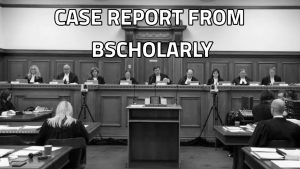Chief R. O Nkwocha V Governor OF Anambra State & ors (1984) 1 SCNLR 634: This is a landmark case on the interpretation of the constitutionality of the Land Use Act. The case also cleared the air as to whether a State Governor can exercise the powers given to the Military Governor under the Land Use Act.

Recommended: Facts, issues and decision of the court in COP v Obolo
Issues for Determination
a. Whether a State Governor can exercise the powers of the Military Governor under the Land Use Act.
b. Whether the Land Use Act is an integral part of the constitution.
Recommended: Countries with the best education system in the world

Fact Summary of Nwkocha V Governor of Anambra
The plaintiff instituted an action in the High Court of Anambra State, Holden at Enugu in respect to the Revocation Notice served on him, dated 16th February, 1981. The contends that the provision of section 28 of the Land Use Act which deals on the revocation power of the Governor does not apply to his deed of assignment in respect to the land in issue. He also contends that the defendant (Governor of Anambra State) has no power under the Land Use Act to revoke his leasehold interest in respect to the plots of land in issue, for the purpose expressed in the revocation notice duly served on him.
During the trial, the Counsel to the plaintiff applied for certain questions of law to be referred to the Court of Appeal for determination. The Counsel to the defendant opposed the application of which the trial court upheld. The trial court went further to hear and determine the matter of which he held against the plaintiff. The plaintiff being dissatisfied filed an appeal in the Court of Appeal. The Counsel to the plaintiff thereon filed an application to the Supreme Court for the determination of certain questions of law.
Also see: Advantages and Disadvantages of Being a Doctor
The first question posed for determination was on the power of a Civilian Governor to exercise the vested on the Military Governor by the Land Use Act. The second question for determination was based on the constitutional status of the Land Use Act, in an event of inconsistency between any provision of the constitution and that of the Land Use Act, whether the Land Use Act will be rendered null and void to the extent of its inconsistency pursuant to section 1 of the constitution.
In other words, does the provision of section 1 of the constitution apply to the Land Use Act, considering the fact that the Land Use Act is entrenched in the constitution? Another question for determination posed by the Counsel was whether the State High Court as the jurisdiction to entertain land matter, considering the fact that the Land Use Act wears the garb of a Federal Enactment.
In determining this matter, the Supreme Court invited amici curiae which include the Attorney General of the Federation and the Attorneys General of all the states to proffer their submission. Counsel to the plaintiff/applicant contends that the Civilian Governor do not enjoy the power that was exercisable by the Military Governor. Therefore, that the Anambra State Governor could not have rightly exercised a power attributable to a Military Governor under the Land Use Act when revoked the appellant’s leasehold interest.

Recommended: Exceptions to Nemo Dat Quod non habet rule
Decision of the court in Chief R. O Nkwocha V Governor OF Anambra State & ors (1984) 1 SCNLR 634
Section 1 of the Land Use Act provides that all land in the state is vested on the Military Governor of that state. Supreme Court interpreted the provision of section 276 of the 1979 constitution to the effect that the power enshrined thereon is from the wordings of the law, intended to be inherited by the successor of the Military Governor. Therefore, the combined effect of section 276 of the constitution and section 1 of the Land Use Act which vests the land in the Military Governor of a state is to the effect that such right of vesting is also exercisable by the Civilian Governor of the state to the same extent as was exercised by the Military Governor.
On the issue of the Land Use Act being a Federal Enactment by the virtue of section 274 of the constitution, the Supreme Court held that by the virtue of section 276 of the constitution, the Land Use Act has its place within the authority of the Governor of a State. In other words, regardless of the Land Use Act being categorized as Federal Enactment by the constitution, the Act can be administered by the State Governor pursuant to the provision of section 276 of the constitution. The State Governor therefore has the power to exercise all rights, power and authorities within his office as contained in the Land Use Act such as; the power to make grants, power to revoke grants, power to enter and inspect, and so on.
Recommended: Donoghue v Stevenson Case Review
On the issue of the constitutional status of the Land Use Act, Supreme Court considered the provision of section 274 (5) of the constitution and held that the Land Use Act is not an integral part of the constitution; it is rather an ordinary statute which became extraordinary by the virtue of it being entrenched in the constitution. The court reasoned that if the Land Use Act was intended to be an integral part of the constitution, the clause “nothing in this constitution shall invalidate” which is the opening sentence of section 274 (5) of the constitution would not have been added, because the constitution could not have been thought to invalidate its part at the first instance.
The Supreme Court desisted from answering the question as to whether any provision of the Land Use Act being inconsistent with the constitution pursuant to section 1 of the constitution should be null and void to the extent of its inconsistency. The court stated that it merely poses an academic question and does not constitute a ground for the substance of the suit.
Recall that the learned Counsel to the appellant filed an application to the Supreme Court for the determination of the questions of law raised in this matter. Based on the fact that this was a mere application before the Supreme Court, the court desisted from making pronouncement on the substance of the suit since the matter is still pending for determination in the Court of Appeal.

Edeh Samuel Chukwuemeka, ACMC, is a lawyer and a certified mediator/conciliator in Nigeria. He is also a developer with knowledge in various programming languages. Samuel is determined to leverage his skills in technology, SEO, and legal practice to revolutionize the legal profession worldwide by creating web and mobile applications that simplify legal research. Sam is also passionate about educating and providing valuable information to people.
Nice review